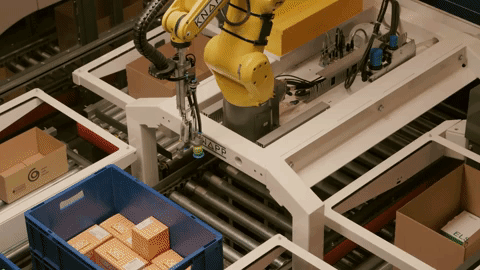Radical’s portfolio company, Covariant AI, offers a glimpse into the future of robotics. This week the company announced its $80 million Series C, in which Radical participated. The raise follows Covariant’s $40 million Series B last May.
The pandemic revealed the brittleness of global supply chains as manufacturing stalled and store shelves went empty. CEOs surveyed last year identified supply chain risk as one of the greatest threats to their organization’s growth. In response, interest in advanced robotics has surged as companies look to the significant productivity gains this technology has brought to the early adopters.
Covariant leverages AI to automate manual tasks performed by human hands. The result is what the team calls the ‘Covariant Brain’. The ‘brain’ is a universal AI for robots — hardware agnostic, all the way through to the robot end-effector or ‘gripper’. The technology enables any robot to see, reason, and act with the world.
AI robotics adoption amongst supply chain players is rapidly accelerating, particularly in warehouses where order-picking comprises up to 63% of total labour costs. Compounding this cost is both an increased demand for goods as e-commerce booms and higher levels of inventory uncertainty due to significant supply chain disruptions. Automation can help support supply chain resiliency while moving human labourers from menial, labour-intensive tasks, to safer, oversight positions.
Industrial robots have only reached a fraction of their potential. Covariant provides a clear vision for the future of robotics having won every competitive request for proposal process they have participated in. Existing customers include Obeta, Knapp, ABB, and Bastian. We are excited to welcome our LPs CPP Investments and Temasek to the Covariant investor group and look forward to supporting Berkeley professor and world-leading AI roboticist Pieter Abbeel, CEO Peter Xi Chen, and the Covariant team in their mission to transform the future of robotics.
AI News This Week
-
How robot carpenters could help solve Canada’s housing crisis (Globe and Mail)
Radical portfolio company Promise Robotics is bringing AI and automation to the construction industry. The company plans to build an entirely automated factory that can manufacture wood-frame single-family home or condominium components, walls and roofs, which can be shipped easily to the project site for rapid assembly. The company is starting in Canada, where there is an affordable housing crisis and a growing talent gap in the construction industry. Promise Robotics’ mission is to help builders, real estate developers, and other AEC industry professionals leverage the efficiencies of industrialized automation, ushering in a new era of affordable and sustainable construction.
-
America’s roads might not be ready for a return to the office, new study shows (US Chamber of Commerce Foundation)
Pittsburgh-based startup and Radical portfolio company RoadBotics used its AI technology to rapidly evaluate the safety of roadways in 20 major US cities. The study found Phoenix and Detroit tied for last place, with Los Angeles close behind. As millions of Americans return to offices, and businesses enter a new phase of recovery, one thing is clear: infrastructure investment has never been more important. View the full report here.
-
Can you teach AI common sense? (VentureBeat)
Developing innate curiosity in AI models, and the consequences that follow, is not well understood or discussed in tech communities. This was a takeaway from professor of psychology Alison Gopnik in our latest Radical Talks podcast where she explains why “AIs need moms.” Following on similar theories to Gopnik’s, scientists at IBM, MIT, and Harvard have developed a series of tests to help evaluate the capacity of AI models to reason like children, by observing and making sense of the world.
-
Sequoia, Jay-Z, Will Smith back Landis’ $165M debt, equity round toward making homeownership accessible to everyone (TechCrunch)
Radical portfolio company Landis has raised Series A funding to help American families reach homeownership through proprietary technology and coaching. Landis’ technology is particularly relevant to those with low-to-moderate income who have been neglected by traditional financial solutions.
-
Quantum computing is coming. What can it do? (Harvard Business Review)
Quantum computing could enable faster AI and significantly increase the accuracy of AI-based predictions and decisions. This would open new opportunities, particularly where complex iterative calculations on massive quantities of data are required, such as facial recognition and fraud detection. “The current limitations on the technology and software make quantum artificial general intelligence a fairly remote possibility — but it certainly makes thinking machines more than a subject for science fiction.”
Radical Reads is edited by Ebin Tomy.

